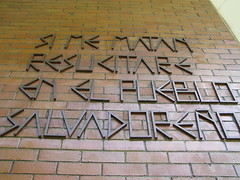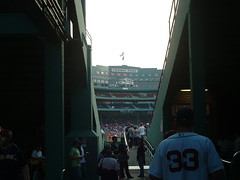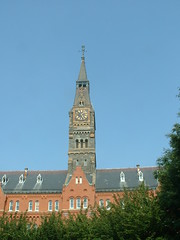This just in....
The Boston Globe
August 21, 2006
Roxbury MA (AP) - A seven-year-old boy was at the center of a Boston
courtroom drama yesterday when he challenged a court ruling over who should have custody of him. The boy has a history of being beaten by his parents and the judge initially awarded custody to his aunt, in keeping with child custody law and regulations requiring that family unity be maintained to the degree possible.
The boy surprised the court when he proclaimed that his aunt beat him more than his parents and he adamantly refused to live with her. When the judge then suggested that he live with his grandparents, the boy cried out that they also beat him.
After considering the remainder of the immediate family and learning that domestic violence was apparently a way of life among them, the judge took the unprecedented step of allowing the boy to propose who should have custody of him. After two recesses to check legal references and confer with child welfare officials, the judge granted temporary custody to the Boston Red Sox, whom the boy firmly believes is not capable of beating anyone.
Ok so I didn't write that, it came in a forward from my dad, but unfortunately it seems to be true. The Sox are tanking, and there is nothing we can do about it. No postseason this year, no World Series, I won’t be wearing my once lucky jersey until late October, and I will be watching football far sooner than I normally care to. All this because the Sox are tanking. When Yankee fans, and I know a few, get into it with me over the sad state of affairs at Fenway park, I simply give a gracious smile if I can, even though deep down I want to tell them precisely what they can do with their $200,000,000 payroll. At some point, though, you just have to laugh, and be able to laugh at yourself and your own situation. When I get upset about the Sox I am obviously taking myself and the game WAY too seriously….. and perhaps losing streaks are most in order for my own spiritual well being at that moment.
I think that we all have things in our lives which, if we are honest, we have to admit that we take way too seriously. In general they are things which are far more important than the Boston Red Sox. They are things which drive us often enough, things which we are passionate about, things which can motivate us, and drive us forward. All of that stuff is straw, as Thomas Aquinas once said, in comparison to knowing and loving God. In the end its not that I shouldn’t enjoy the Red Sox, with their ups and downs, but its that moments like this remind me how insignificant something like being a baseball fan is in the long run. Its fun, but will I remember who played second base for the ’06 Sox in 20 years? Probably not. I am a passionate baseball fan, no doubt, but this applies to other things, be it what I enjoy studying in philosophy, or the kind of apostolic work I do, in the end, its all one small, broken gift which we offer up to God, to be made whole in the glory of his Love for us. That is the same love which flows through each of us in the person of the spirit, and the very thing which impels us on to the one thing which is not straw in the end, God himself.
Tuesday, August 29, 2006
Monday, August 14, 2006
Chilling by the ocean
Ahhh Cohasset, that enduring finish line of every year right before a new one begins, this is where I take my vacation drinking strange beers and smoking dry cigars, and more importantly it is here that I catch up with Jesuit brothers who I see only once in a blue moon. That picture to the right is where I am on vacation right now. Vacation is, for me, more than just a time to rest and lay out by the pool. (Which, in fact, would have disastrous results given my all too Irish skin.) Vacation is a time to gain fresh fruits even in the last moments of summer, to be refreshed, renewed, and to spend some time in gratitude, basking in the warm glow of God’s love and our benefactor’s generosity.
Benedict XVI said in his angelus address for this week that: “Vacation also makes for a precious opportunity to spend more time with family, to reunite with relatives and friends, in a word to give more space to the human contact which the rhythms of everyday tasks keep from being cultivated as we would like.” Those relationships are at the very core of my and any vocation, not just to religious life and priesthood, but in general. It is those relationships which support us, which help us to grow and become increasingly the person we were created to be, it is those relationships which are at the very heart of how it is that we experience Christ himself. Genuine companionship with others is at the heart of the Christian mystery, because Christ consistently creates community, among the apostles, disciples, and among the whole Church. In the end the mystical act of giving His body and blood to us in the Eucharist is enjoined by the prayer that they all may be one as He is one with the Father. Augustine says that by the Eucharist we become what we consume, that is the Body of Christ which Paul identifies as being the Church, community itself.
Often times it is the rhythm of mundane life which breaks those bonds, and can leave us with a feeling of loneliness, of isolation, and alienation. The desert fathers warned against just such a thing when they warned against sloth in the spiritual life, and I think it applies here. Sometimes the day to day wears us down, and makes us slothful around community life. Such is a reality for us all, when work, study, or other circumstances make us less intentional about tending to the people that we care about, especially those not immediately present to us, we lose something. We lose a sense of our deeper connectedness, we lose a sense of just how much we are genuinely loved by those friends and family who care for us, and that is a dangerous thing.
So here I am at Cohasset, on vacation, resting, recouping, and perhaps most importantly reconnecting with many of the people who make this life worthwhile, enjoyable, and living in gratitude for it.
Benedict XVI said in his angelus address for this week that: “Vacation also makes for a precious opportunity to spend more time with family, to reunite with relatives and friends, in a word to give more space to the human contact which the rhythms of everyday tasks keep from being cultivated as we would like.” Those relationships are at the very core of my and any vocation, not just to religious life and priesthood, but in general. It is those relationships which support us, which help us to grow and become increasingly the person we were created to be, it is those relationships which are at the very heart of how it is that we experience Christ himself. Genuine companionship with others is at the heart of the Christian mystery, because Christ consistently creates community, among the apostles, disciples, and among the whole Church. In the end the mystical act of giving His body and blood to us in the Eucharist is enjoined by the prayer that they all may be one as He is one with the Father. Augustine says that by the Eucharist we become what we consume, that is the Body of Christ which Paul identifies as being the Church, community itself.
Often times it is the rhythm of mundane life which breaks those bonds, and can leave us with a feeling of loneliness, of isolation, and alienation. The desert fathers warned against just such a thing when they warned against sloth in the spiritual life, and I think it applies here. Sometimes the day to day wears us down, and makes us slothful around community life. Such is a reality for us all, when work, study, or other circumstances make us less intentional about tending to the people that we care about, especially those not immediately present to us, we lose something. We lose a sense of our deeper connectedness, we lose a sense of just how much we are genuinely loved by those friends and family who care for us, and that is a dangerous thing.
So here I am at Cohasset, on vacation, resting, recouping, and perhaps most importantly reconnecting with many of the people who make this life worthwhile, enjoyable, and living in gratitude for it.
Tuesday, August 08, 2006
What my time in Georgetown has meant.
I read my final evaluation of my time at Georgetown working in the hospital today and I have been, as I finish up my self- evaluation, figuring out what my time here has meant…..
Strangely enough given that my job is pretty much talking to whoever will listen or whoever will talk back with their own spiritual needs, I think that for me in a lot of ways it has been a time to embrace silence. It’s a different silence though, not one of total quiet, not one in which I have been jealously guarding my solitude, but rather a silence which has allowed me to allow God to bring me back to life in a lot of ways.
This past year was a tough one for me. Many things happened in the context of my life at SLU. Friendships were made and broken, people came and went from my life. I have had to come into better contact with what these vows I have taken mean concretely. The honeymoon of vows ended; there was no more novice master to guide me as closely as they do. I was left to be a Jesuit on my own accord. I didn’t do that perfectly by any stretch, and by the end of the year I found myself asking in my retreat that whatever small, humble offering I was making to God would be a sufficient enough manifestation of my love for him who loved me first. In the midst of whatever struggles I was having two of my closest Jesuit friends left, and I was left to mourn the loss of friendships which were for me a constant support and continual joy. I had a bit of a premonition that last year would be tough, that it would involve some suffering, and it did. Maybe such a premonition was a self fulfilling prophecy, but the reality is that it doesn’t matter if ti was or wasn’t. What matters most is the reality itself, that last year was hard, and I learned deeply the meaning of “take up your cross and follow me”..
So why am I writing all of this? Well it’s because of the silence. Sometimes after death and suffering we all need to enter into the only appropriate response, silence. When I was a novice in the Society during the full boat Spiritual Exercises of St. Ignatius we spent a whole day meditating on Christ dead in the tomb. For some of the novices this meant staying in their room all day and emerging as little as possible. I didn’t do that, but I did spend that day in the silence, anticipating Easter. Some of that silence is sitting face to face with the cold hard reality of death itself and the ways in which it causes us to come up against our own mortality, which is the ultimate limitation of ourselves. We come to realize just how finite we are, and there is a great sense of liberation in the humility that that can bring. This is a lesson though that I have learned over and over again this summer, and it’s been a summer of that silence which can do nothing but simply be with itself, simply face the reality that there are many forms death takes even while we are alive.
I have faced this all with the poverty of spirit I prayed for earlier this summer; the sense of my radical dependence on God, and that has been healing. The hospital forces your hand on that, being with people, walking with them on their journey, makes you embrace those quiet moments when all you can do is keep silence, those moments when healing can only come in a complete lack of words. The time in the tomb here at Georgetown, that is, this time in the silence away from many of the realities which were at the center of that suffering, this time to rethink and reclaim, this time to remember my own deeper poverty, this time to come to terms with the possibility of resurrection..
Strangely enough given that my job is pretty much talking to whoever will listen or whoever will talk back with their own spiritual needs, I think that for me in a lot of ways it has been a time to embrace silence. It’s a different silence though, not one of total quiet, not one in which I have been jealously guarding my solitude, but rather a silence which has allowed me to allow God to bring me back to life in a lot of ways.
This past year was a tough one for me. Many things happened in the context of my life at SLU. Friendships were made and broken, people came and went from my life. I have had to come into better contact with what these vows I have taken mean concretely. The honeymoon of vows ended; there was no more novice master to guide me as closely as they do. I was left to be a Jesuit on my own accord. I didn’t do that perfectly by any stretch, and by the end of the year I found myself asking in my retreat that whatever small, humble offering I was making to God would be a sufficient enough manifestation of my love for him who loved me first. In the midst of whatever struggles I was having two of my closest Jesuit friends left, and I was left to mourn the loss of friendships which were for me a constant support and continual joy. I had a bit of a premonition that last year would be tough, that it would involve some suffering, and it did. Maybe such a premonition was a self fulfilling prophecy, but the reality is that it doesn’t matter if ti was or wasn’t. What matters most is the reality itself, that last year was hard, and I learned deeply the meaning of “take up your cross and follow me”..
So why am I writing all of this? Well it’s because of the silence. Sometimes after death and suffering we all need to enter into the only appropriate response, silence. When I was a novice in the Society during the full boat Spiritual Exercises of St. Ignatius we spent a whole day meditating on Christ dead in the tomb. For some of the novices this meant staying in their room all day and emerging as little as possible. I didn’t do that, but I did spend that day in the silence, anticipating Easter. Some of that silence is sitting face to face with the cold hard reality of death itself and the ways in which it causes us to come up against our own mortality, which is the ultimate limitation of ourselves. We come to realize just how finite we are, and there is a great sense of liberation in the humility that that can bring. This is a lesson though that I have learned over and over again this summer, and it’s been a summer of that silence which can do nothing but simply be with itself, simply face the reality that there are many forms death takes even while we are alive.
I have faced this all with the poverty of spirit I prayed for earlier this summer; the sense of my radical dependence on God, and that has been healing. The hospital forces your hand on that, being with people, walking with them on their journey, makes you embrace those quiet moments when all you can do is keep silence, those moments when healing can only come in a complete lack of words. The time in the tomb here at Georgetown, that is, this time in the silence away from many of the realities which were at the center of that suffering, this time to rethink and reclaim, this time to remember my own deeper poverty, this time to come to terms with the possibility of resurrection..
Friday, August 04, 2006
Prophets of a Future Not Our Own

"If they Kill me, I will Arise in the Salvadoran People"
-Oscar Romero (from outside the U.C.A. Chapel)
Photo by Laura Hershberger
Scripture:
Deuteronomy 34
Psalm 30
John 21
Prayer/Poem "Prophets of a Future Not Our Own" attr. to Archbishop Oscar Romero
There is a sense of liberation in knowing we cannot do everything. We are ministers, not messiahs, workers, not master builders. At some point for each of us there is a moment where we have to leave behind a project, a job, a way of life, in order to carry on to whatever the next stage may be. For some of us, very practically here, this means that at the end of these next few weeks we will leave our jobs as chaplains here in the hospital and move to carry on our ministry elsewhere. For some watching or listening, this may mean very practically that what has happened in the context of your being here in the hospital, whether it is illness, surgery, birth, or death has changed your lives to such an extent that you will not, cannot go back from where you came.
We can mourn this part of our lives just as much as anything else, and we should though we may also look ahead and see the work that will be done, but will not be for us to do. In our reading from Deuteronomy, Moses looks into the holy land, the fulfillment of his prophetic longings, but does not, cannot, enter in. Of course scripture points to this being punishment for having doubted God, but there is more at stake here. The kingdom of God, the story of our salvation, both supersedes any one man and is at the same time fully realized in one man, who was also God. We are not God though. Moses, the greatest of the prophets, was not God. In truth we carry nothing to completion, but each event finds its fruition in the community of believers that we gather around us as the people of God. For Moses the realization of his dream was a realization through his progeny, which was a free community of God’s chosen people now coming into the inheritance God had promised them. For many of us it may be the same, and often it is the case with the greatest who walk among us, those men and women like Moses, Martin Luther King Jr., and the author of the poem which is at the center of this reflection, Oscar Romero, we too might just be able to walk to the Jordan, but not cross over. The future we prophesy is so often not our own, and often the world which we try to create is one which is just a little better, a little more loving, a little more humane for our children, and their children, entrusting to them what was once entrusted to us, the gift to participate with God’s grace in the shaping of the kingdom of God on earth as it is in heaven.
The Psalmist comes to us with a perspective which says that we can sometimes think that we shall never be shaken. But we know better, for people who are sick and in the hospital very often it seems as if God seems to be hidden, and that the best of our efforts in life, because of illness or injury will ultimately come to nothing, that with the psalmist we might ask “will my life blood come to nothing?” We have hope in God though, and it can be in just that recognition of our relationship with God which is made manifest in crying out for mercy for whatever humble, broken, offering we make of our lives in which we can allow God to show us his mercy, his love, and that we can know that our incomplete offering is merely a step along the way, and an opportunity for God’s grace to enter in and do the rest in our lives.
We sometimes need to step back and look at the broader picture, because in context what little we accomplish in our lifetimes often makes a significant contribution to the building of the kingdom of God, and the seed we sow, though we may never reap it, bears fruit far beyond our imagination. There is a commitment in this to participate in the building of that kingdom for each of us; a commitment to participate in the sowing of the seed; a commitment to participate in the watering of that which is already planted. That commitment is the command of Christ to Peter that we hear in our Gospel reading, to love Christ is to feed his sheep and tend his flock. This is perhaps the only pastoral visit in recorded history which one could argue brings wholeness, Christ visiting Peter after the resurrection, the Messiah himself, brings forgiveness and a chance to amend his life to Peter to counter act the Peter’s denial of the kingdom in the face of the fear of the crucifixion that all Christ had said and done would be for naught. The resurrection stands as the surest hope, that life never really ends, it changes. The resurrection is the surest hope that in our weeping we will find joy. The resurrection is the surest hope that the seed which falls to the earth and dies lays dormant only for a while, only to see bountiful grain arise after the shoot which produced that seed is long gone. Yet there is, even in this, a sense that no life is completely filled, no life given its fullest meaning on its own merits. Jesus warns Peter: “Amen, amen, I say to you, when you were younger, you used to dress yourself and go where you wanted; but when you grow old, you will stretch out your hands, and someone else will dress you and lead you where you do not want to go." Even Peter, seemingly made whole by the work of Christ himself is left with a moment to ponder, that his work may never be full, may never be complete, and that in that moment of recognizing his limitation, there is the liberative moment of Christ’s words to him: “Follow Me.”
So it is for us, we may never see end results, and what we do may in the end be very incomplete. Still we minister; still we love, hoping for the kingdom which is beyond our vision. Still we plant and water the seeds which may not be our own, but in truth belong to future generations. Still we find meaning in our lives as incomplete as they may actually be, because we participate in something much larger than ourselves, and in this hope we prophesy of the kingdom of God, we prophesy of a future that is not our own.
Subscribe to:
Posts (Atom)


